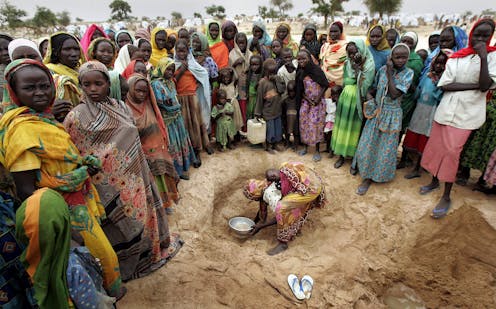Can mass atrocities be prevented? This course attempts to answer the question
- Written by Mike Brand, Adjunct Professor of Genocide Studies and Human Rights, University of Connecticut

We then explore the ethical principle called “responsibility to protect,” committed to in a United Nations agreement in 2015[13], including its first test with the genocide in Darfur, Sudan[14]. Individual governments are responsible for preventing their citizens from experiencing genocide, war crimes, ethnic cleansing and crimes against humanity. However, if a government is unable or unwilling to protect its people, then the international community must do so.
We also look at the modern-day global anti-genocide movement and efforts to prevent mass atrocities, including by sanctions – though there is little evidence to suggest[15] they work – and military intervention, which is quite rare.
Then we discuss U.S. foreign policy efforts, including the Elie Wiesel Genocide and Atrocities Prevention Act[16] of 2018, which made it the policy of the United States to “regard the prevention of atrocities as in its national interest.” We also discuss the development of a governmentwide strategy[17] to prevent and respond to mass atrocities around the world.
I’ve found that students appreciate learning about what the U.S. government is and is not doing to confront mass atrocities.
The course culminates with a group presentation and individual research into an ongoing mass atrocity situation. After they complete their projects, students often make comments like “I had no idea this was happening” or “I can’t believe I never heard about this before.”
Why is this course relevant now?
Unfortunately, this course will likely be relevant for years to come as mass atrocities continue to occur in several places around the world. The ongoing atrocities in Ukraine[18] and genocide against the Uyghurs in China[19] show how intractable these issues are when a powerful nation is the one committing atrocities.
What’s a critical lesson from the course?
The United States has been accused of complicity in the commission of war crimes[20] in Yemen through its continued support of violence committed by Saudi Arabia and allied forces. This provides an example of how the U.S. does not always play a positive role on the international stage.
What materials does the course feature?
The documentary “Watchers of the Sky[21]” provides the students with a strong background on the topic of mass atrocities. It discusses the creation of the term “genocide[22]” in 1944, and explores key examples, including the Nuremberg trials[23] in the wake of World War II and more recent efforts by the International Criminal Court.
Chapters from Scott Straus’ “Fundamentals of Genocide and Mass Atrocity Prevention[24]” provide a great overview of some key topics.
David Moshman’s 2001 paper “Conceptual constraints on thinking about genocide[25],” which discusses how not all genocides will resemble the Holocaust. It is important to know that a situation may fit the definition of genocide – intent to destroy, in whole or in part, a national, ethnic, racial or religious group – without employing death camps and gas chambers.
What will the course prepare students to do?
I believe the course provides my students with tangible ways they can get more involved in atrocities prevention advocacy and programs.
They also learn how to research U.S. legislation that is relevant to genocide, contact members of Congress, write op-eds and create fact sheets.
By giving assignments like this, in addition to more traditional papers, my students learn how to effectively engage in human rights advocacy, even in a small way.
References
- ^ Uncommon Courses (theconversation.com)
- ^ Holocaust (www.ushmm.org)
- ^ Cambodia’s Killing Fields (www.ushmm.org)
- ^ scholar-practitioner (humanrights.uconn.edu)
- ^ Syria (www.ushmm.org)
- ^ Ethiopia (www.ushmm.org)
- ^ South Sudan (www.ushmm.org)
- ^ Yemen (www.washingtonpost.com)
- ^ the definitions of mass atrocities (www.ushmm.org)
- ^ International Criminal Tribunal for Rwanda (unictr.irmct.org)
- ^ International Criminal Court (www.icc-cpi.int)
- ^ AP Photo/Javier Bauluz (newsroom.ap.org)
- ^ United Nations agreement in 2015 (www.globalr2p.org)
- ^ genocide in Darfur, Sudan (www.ushmm.org)
- ^ there is little evidence to suggest (doi.org)
- ^ the Elie Wiesel Genocide and Atrocities Prevention Act (www.congress.gov)
- ^ governmentwide strategy (www.state.gov)
- ^ ongoing atrocities in Ukraine (truthout.org)
- ^ genocide against the Uyghurs in China (2017-2021.state.gov)
- ^ United States has been accused of complicity in the commission of war crimes (www.theguardian.com)
- ^ Watchers of the Sky (www.youtube.com)
- ^ genocide (doi.org)
- ^ Nuremberg trials (encyclopedia.ushmm.org)
- ^ Fundamentals of Genocide and Mass Atrocity Prevention (www.ushmm.org)
- ^ Conceptual constraints on thinking about genocide (doi.org)
Authors: Mike Brand, Adjunct Professor of Genocide Studies and Human Rights, University of Connecticut

